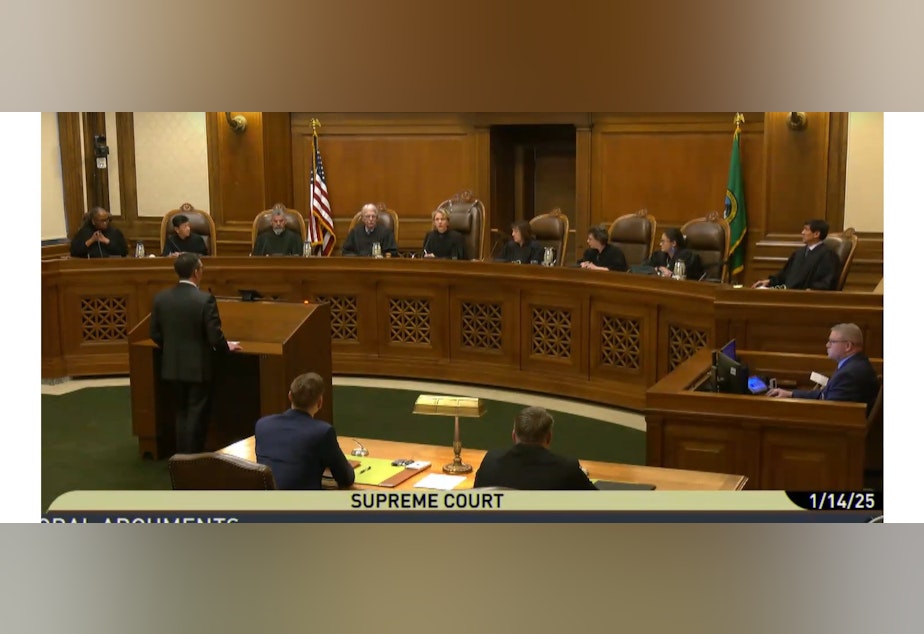High-capacity gun magazine ban upheld by WA Supreme Court. Opponents could seek SCOTUS review

The Washington Supreme Court has upheld the state’s 2022 ban on sales of large capacity magazines containing more than 10 rounds of ammunition.
While the Washington State Attorney General has praised the decision, lawyers for the gun store in the case say they're considering a petition to the conservative-majority U.S. Supreme Court for review.
The 7-2 decision stems from a challenge by Gator’s Custom Guns in Kelso, Washington, which argued that the ban violated right to bear arms in the state and U.S. constitutions. The law banned the sales and purchase of large capacity magazines in the state but allowed for the possession of existing ones.
A majority on the court found that the large capacity magazines “are not ‘arms’ within the meaning of either constitutional provision.” The opinion states, “By restricting only magazines of a capacity greater than 10, the statute effectively regulates the maximum capacity of magazines, leaving the weapon fully functional for its intended purpose.”
They said while ammunition is a necessary and integral component to operating a firearm, the magazines are more like “containers” which the state argued are added to make weapons “more capable of mass murder.”
Sponsored
Washington’s candidates for attorney general in 2024 faced off on opposite sides of this legal challenge. Democrat Nick Brown worked to maintain the ban, both in private practice and then once elected last year. Republican Pete Serrano’s Silent Majority Foundation represented Gator’s Custom Guns in their fight against it.
Now-Attorney General Nick Brown hailed the decision Thursday, calling it “a reaffirmation for the fact that we can continue to advance gun safety measures in Washington, and do it consistent with the Washington State Constitution and Second Amendment.”
He added, “This decision will mean more safety, more lives saved in Washington, so it’s great.”
For Serrano's part, he said he was disappointed with the majority opinion but excited by the dissenting opinion authored by Justice Sheryl Gordon McCloud and joined by Justice G. Helen Whitener.
The dissent refuted the majority opinion’s definition of “arms,” which Serrano called the crux of the case. The dissent said gun magazines of all sizes are indeed “arms” as defined in recent U.S. Supreme Court decisions and the ban “regulates conduct that is presumptively protected by the Second Amendment.”
Sponsored
Serrano agreed saying, “We do believe that these large capacity magazines are integral to the operations of the firearm,” adding that firearms “are protected for a multitude of uses that are lawful.” He said those questions could form the basis for their petition to the U.S. Supreme Court for review.
In its decision, the state Supreme Court denied the attorney general's request to reassign the case to a judge other than Cowlitz County Superior Court Judge Gary Bashor, who struck down the ban in April 2024. (His decision was stayed pending the appeal so the ban remained in place.)
The state Supreme Court sent the case back to Bashor, whose decision striking down the ban the higher court overturned, while noting his “strong feelings” that the ban on large capacity magazines was unconstitutional.
“Given an order that the statute is constitutional and therefore valid, Judge Bashor will be bound to our decision on that issue” and will consider the gun store's alleged violation of the state law, the justices said. Gator’s allegedly continued to sell the large capacity magazines after the state ban, ESSB 5078, went into effect.
This year the legislature passed a new bill requiring a permit to purchase firearms. Brown said he supports the measure and looks forward to seeing Gov. Bob Ferguson sign it into law.
Sponsored
“I think it’s a great step forward for the state,” Brown said. “The data really backs up the fact that states that have adopted similar pieces of legislation have continued to see gun violence decline.”
Brown said he's concerned that Washington State continues to see more deaths from gun violence than other states like New Jersey and Massachusetts with similar laws on the books.
"We as a state need to continue to push forward and figure out all of the things that keep people safe," he said.
Meanwhile, Serrano said the practical effect of the current ban on large capacity magazines has meant that people can’t purchase replacements for broken equipment. He said licensed dealers have had to curtail or modify the firearms they sell that typically included the large capacity magazines as well.
“It’s drastically impacted my ability to procure not just the magazines, but certainly firearms," Serrano said. "And that’s true for any member of the public.”




